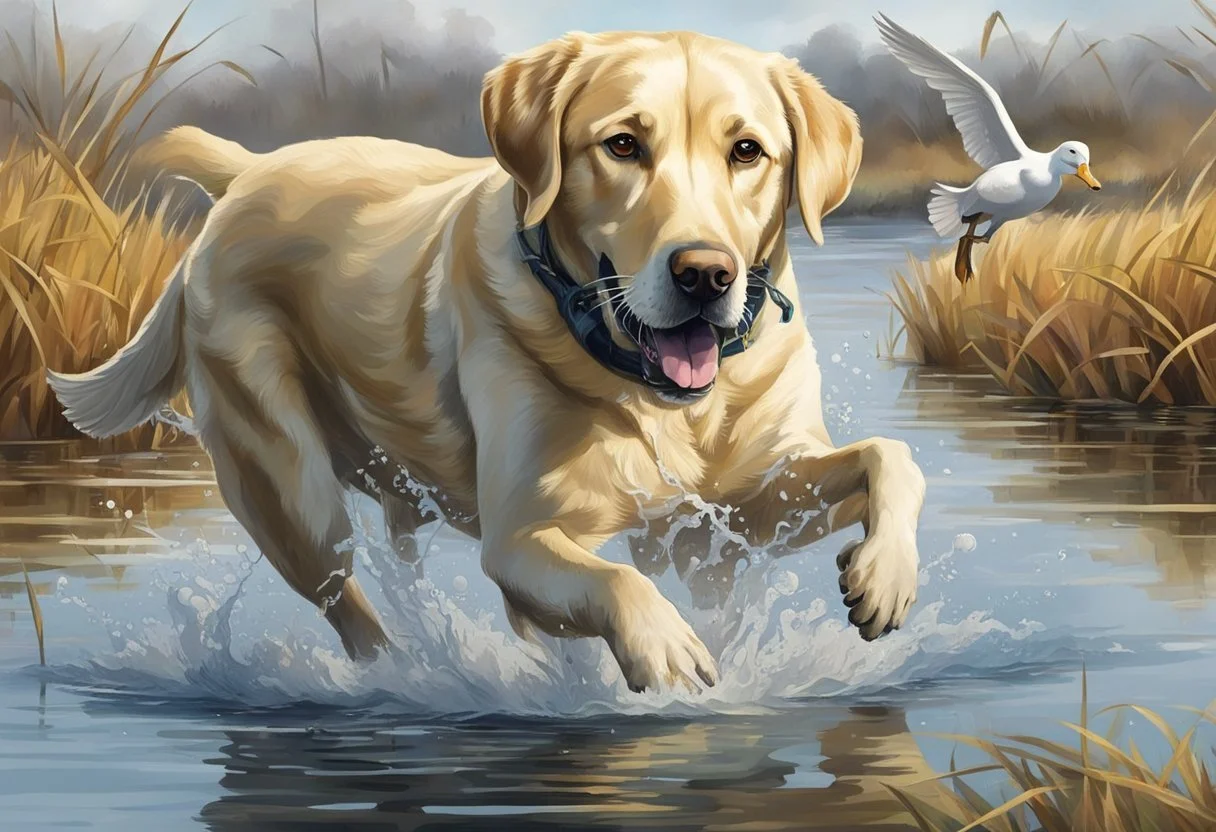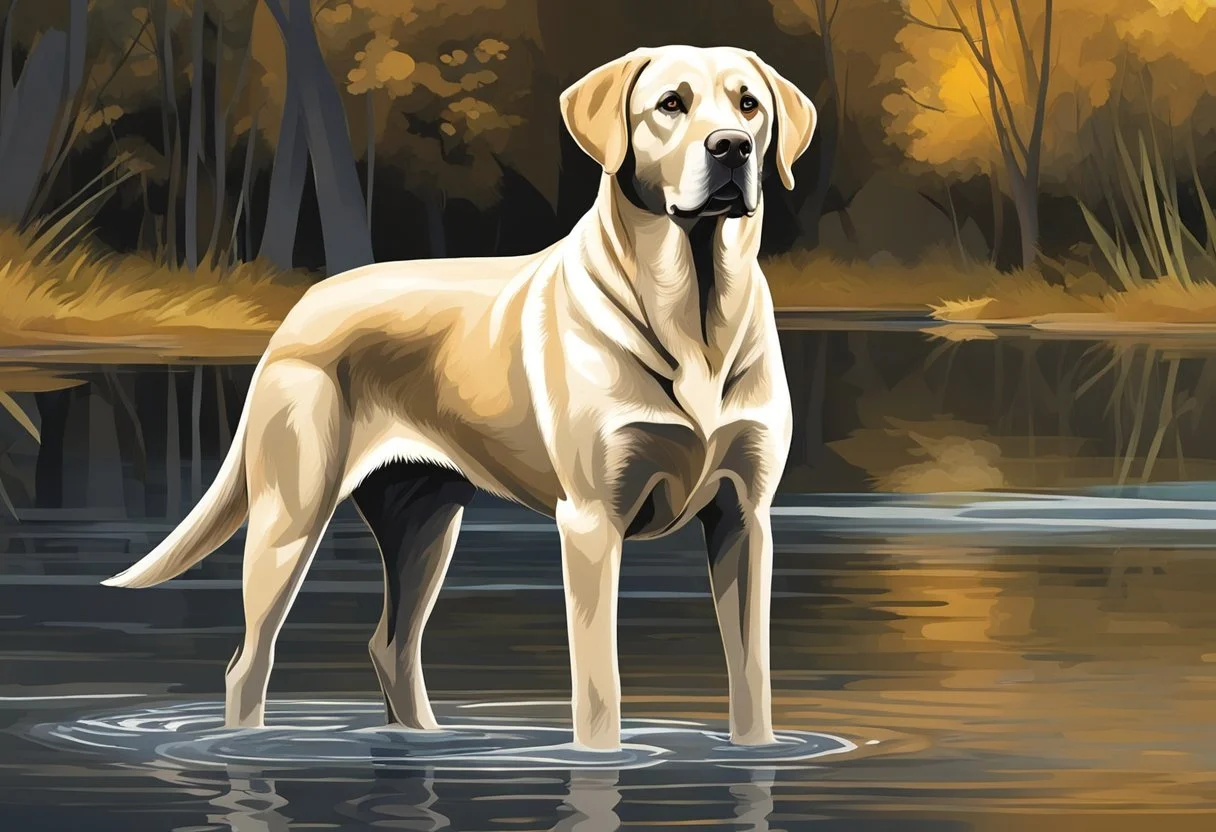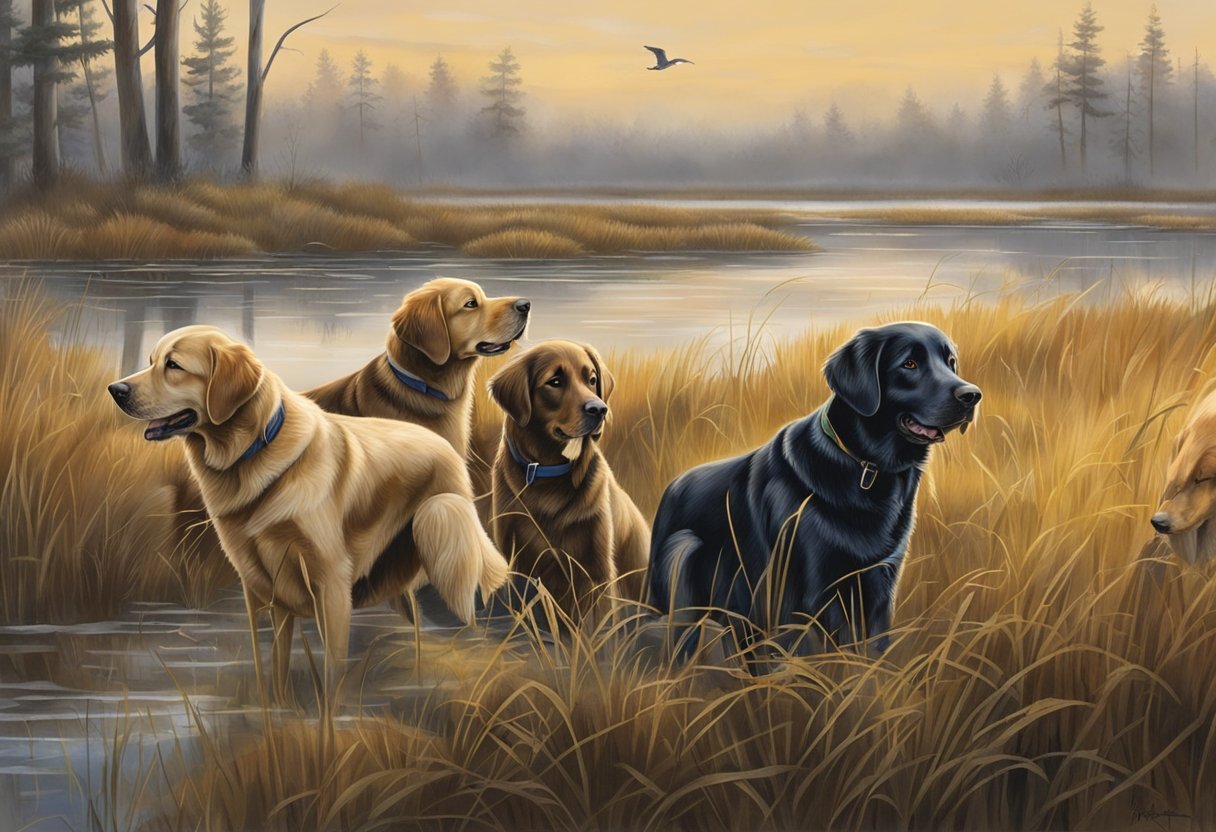Best Duck Hunting Dogs
Top Breeds for Avid Hunters
Discover > Texas Outdoorsman > Best Duck Hunting Dogs
Duck (What wine goes well with duck?) hunting has been a treasured pastime for many generations, and the value of having a loyal and capable canine companion by one's side cannot be overstated. Duck hunting dogs are specially trained and have specific characteristics that make them perfect for retrieving game from water and land. Selecting the right breed for this task is essential to a successful hunting experience.
Many dog breeds have been developed over the years to be exceptional waterfowl retrievers. They possess a strong prey drive, excellent swimming abilities, and a coat that allows them to withstand cold water temperature. Additionally, these dogs also maintain an eagerness to please their handler, enabling them to be dependable working companions.
In this article, we will explore some of the best duck hunting dogs, focusing on their strengths, breed characteristics, and trainability. By understanding these factors, one can make an informed decision when choosing the ideal furry friend to enhance their duck hunting experience.
Choosing the Right Breed
Breed Traits and Characteristics
When selecting the perfect duck hunting dog, it's essential to consider various breed traits and characteristics. Some popular breeds for duck hunting include retrievers such as the Labrador Retriever and the Golden Retriever, and spaniels like the English Springer Spaniel. These breeds are known for their intelligence, loyalty, and strong swimming abilities.
The American Kennel Club (AKC) provides detailed breed standards for each breed, outlining the physical and behavioral traits that make them suitable for hunting tasks. These standards can guide you in understanding the breed evolution and selecting the appropriate dog for your hunting needs.
Understanding Hunting Dog Pedigree
A dog's pedigree plays a significant role in its hunting abilities. When choosing a hunting dog, it is crucial to understand its lineage and how it has been bred for specific tasks.
Some key elements to consider include:
Parents and grandparents with proven hunting abilities
High-quality breeders with a focus on hunting dog lines
Health clearances and certifications (e.g., hips, elbows, eyes)
Studying a dog's pedigree and choosing from reputable breeders ensure that your hunting dog has a strong genetic background, increasing your chances of success in the field.
Key Considerations for Duck Hunters
Duck hunters must weigh several factors before selecting the perfect hunting dog breed. Some critical considerations include:
Swimming ability: A good duck hunting dog should be a strong and confident swimmer, capable of retrieving downed ducks from cold water.
Trainability: Dogs with high intelligence and a strong desire to please are typically easier to train, making them ideal for hunting tasks.
Temperament: Duck dogs should have a calm and balanced temperament that allows them to focus on the task at hand while remaining responsive to their handler's commands.
Size: Some hunters prefer a smaller dog, such as a spaniel, which can easily navigate dense cover, while others may opt for a larger retriever that can handle more extensive water retrieves.
Family compatibility: Many breeds, like Labrador Retrievers, also make excellent family dogs. If your hunting dog will also be a family pet, consider a breed with a reputation for being good with children.
Top Duck Hunting Dog Breeds
Labrador Retriever
The Labrador Retriever is the most popular breed for duck hunting. Known for their intelligence, loyalty, and strong swimming ability, these dogs excel in retrieving ducks from water. Labrador Retrievers are prized for their soft mouths, as they can gently carry game without damaging it.
Notable Traits: intelligence, strong swimming, soft mouths
Recommended for: beginners, experienced hunters
Golden Retriever
Another excellent duck hunting breed, the Golden Retriever possesses similar traits to the Labrador Retriever. Along with their high intelligence, this breed learns commands quickly and is eager to please. Golden Retrievers are great swimmers and have a water-repellent coat to keep them warm and dry.
Notable Traits: high intelligence, great swimmers, water-repellent coat
Recommended for: beginners, experienced hunters
Chesapeake Bay Retriever
Chesapeake Bay Retrievers are powerful and energetic hunting dogs. This breed has a double-layer thick waterproof coat, allowing them to withstand harsh conditions during hunting excursions. While a Chesapeake Bay Retriever excels in the water, these dogs are also smart enough to learn how to flush out pheasants, grouse, quail, and other game birds. Chesapeake Bay Retrievers may be more challenging for novice trainers due to their strong-willed nature.
Notable Traits: waterproof coat, energetic, strong-willed
Recommended for: experienced hunters
German Shorthaired Pointer
German Shorthaired Pointers are agile and versatile, great duck hunting dogs. They have a natural ability to point and retrieve, making them highly efficient in a duck hunt, retrieving ducks from both land and water. The breed's strong sense of smell helps locate hidden game in a duck hunt.
Notable Traits: agility, versatility, strong sense of smell
Recommended for: experienced hunters
Boykin Spaniel
Originating from South Carolina, the Boykin Spaniel is a compact and energetic hunting companion. This breed is an excellent swimmer and thrives in marshy environments. The Boykin Spaniel is known for its friendly and sociable nature, making it a great choice for hunters wanting a close bond with their dog.
Notable Traits: compact size, excellent swimmer, friendly nature
Recommended for: beginners, experienced hunters
While not included as separate subsections, breeds such as the Nova Scotia Duck-Tolling Retriever, American Water Spaniel, Curly-Coated Retriever, and English Springer Spaniel also offer great skillsets for duck hunting. These dogs are reliable choices for hunters looking to expand their selection of hunting companions.
Training Your Duck Hunting Dog
Basic Obedience Training
Before diving into specialized duck dog training, it's crucial to ensure your dog has a strong foundation in basic obedience. Intelligent and highly trainable breeds, such as Labradors and Golden Retrievers, typically excel in this area. Start with essential commands like sit, stay, heel, and down. It's important to remember that different breeds may have varying energy levels, so patience and consistency are key.
Reinforce your Golden Retriever natural instincts and obedience by incorporating these basic commands into everyday activities. This can help build a strong bond between you and your dog, which is crucial for successful training.
Advanced Waterfowl Training Techniques
Once your dog is proficient in basic obedience, you can begin to introduce more advanced waterfowl training techniques. Some key skills to focus on include:
Retrieving: Train your dog to efficiently retrieve ducks in various conditions, such as water and thick vegetation. Start by using training dummies and gradually introduce decoys into the mix.
Blind retrieves: A well-trained duck hunting dog should be able to find and retrieve ducks that are hidden from their direct line of sight, which is essential for successful hunts. Practice blind retrieves with decoys or training dummies in various environments.
Steadiness: It's crucial for your dog to remain calm and focused in the presence of distractions, such as gunfire or other dogs. Train your dog to remain steady by gradually introducing distractions during practice sessions.
Training for Specific Hunting Scenarios
Tailoring your training program to the specific hunting scenarios you'll encounter is essential for success in the field. This can include practicing in various terrain types, such as swamps, marshes, or fields, and ensuring your dog is comfortable retrieving both on land and in water. Incorporate decoys and scent work to simulate real-world conditions, and practice both blind and marked retrieves.
Remember that each dog's intelligence and natural instincts will differ, so it's essential to observe and adapt your training methods to suit their individual needs and strengths. By combining a strong foundation in basic obedience with advanced waterfowl training techniques and scenario-specific practice, you'll have a confident, knowledgeable, and effective duck hunting dog by your side.
Physical and Mental Characteristics
Energy and Stamina
Duck dogs are known for their energy and stamina. These dogs require high levels of physical activity to stay fit and healthy. They typically possess strong athletic abilities, resulting in excellent speed, endurance, and hardiness for long hunting sessions. Their energetic nature is also a crucial factor for their sense of smell and tracking ability.
List of key characteristics related to energy and stamina:
High energy levels
Strong, athletic build
Good endurance for prolonged activity
Hardiness in various terrains
Intelligence and Trainability
Intelligence and trainability are essential factors when it comes to duck dogs. These dogs should be quick learners and responsive to their owner's commands. They possess a strong prey drive, allowing them to focus on a task, such as retrieving or tracking down ducks. Their sense of duty and instinctual hunting abilities typically result in better performance during hunts.
Key characteristics related to intelligence and trainability:
Quick learners
Responsive to commands
Strong prey drive
Instinctual hunting abilities
Size and Physical Agility
Size and physical agility are critical attributes of an effective duck hunting dog. A suitable size for duck dogs should not be too large to be agile, nor too small to be ineffective in retrieving game. Generally, these dogs need to be able to quickly navigate various terrains, from marshy fields to dense forests. Their physical agility enables them to excel in tracking and chasing down prey.
Notable characteristics related to size and physical agility:
Appropriate size for navigating varied terrains
Agile and fast
Good at tracking and chasing prey
Flexible and adaptable
Health and Care
Nutrition for Hunting Dogs
Proper nutrition is essential for maintaining the health and performance of hunting dogs, particularly those specialized in duck hunting. A balanced and highly nutritious diet will ensure that these dogs have the energy, endurance, and focus needed in the field. It is important to feed adult hunting dogs a high-protein diet that includes quality animal-based proteins, as well as complex carbohydrates for sustained energy release.
For optimal performance, it is recommended to feed duck dogs a diet with:
At least 30% protein
Between 14% to 25% fat
A mix of fruits, vegetables, and grains for fiber and micronutrients
Adjust the amount of food according to the dog's activity level and avoid overfeeding to prevent obesity and other related health issues.
Exercise and Health Maintenance
Regular exercise and maintaining a healthy weight are vital for keeping hunting dogs in optimal condition. Duck dogs should engage in daily physical activities that challenge both their bodies and minds. This can include:
Long walks or jogs
Fetching games
Swimming
Obedience or agility training
Ensure that duck hunting dogs receive regular veterinary check-ups and vaccinations to protect against diseases and identify any potential health issues early.
Common Health Issues
Duck hunting dogs, like all working breeds, may be prone to certain health issues. Some common concerns among hunting breeds include:
Hip and elbow dysplasia: Regular screening and maintaining a healthy weight can help manage and prevent this genetic condition
Eye-related problems: Annual eye exams are essential for detecting and treating issues such as progressive retinal atrophy or cataracts
Ear infections: Due to their exposure to water, duck hunting dogs should have their ears checked and cleaned regularly to prevent infections
Skin allergies: Monitor for signs of allergies, such as itching or skin irritation, and consult a veterinarian for appropriate treatment options
Obesity: Proper nutrition and regular exercise are crucial in preventing excess weight gain and associated health risks
Being aware of these potential health issues and taking appropriate preventative measures can help ensure a long, healthy, and successful hunting career for your duck hunting dog.
Gear and Accessories
Essential Hunting Gear
When preparing for a duck hunting adventure, it's crucial to have the right gear for both you and your hunting dog. Proper gear ensures safety, comfort, and a more enjoyable experience. Below is a list of some essential gear for both you and your canine companion:
For the Hunter:
Hunting clothing: Camouflage or waders to remain concealed in the hunting area.
Hunting boots: Waterproof and insulated boots keep your feet dry and warm.
Firearms: Shotguns are typically the weapon of choice for duck hunters.
Ammunition: Steel or other non-toxic shotgun shells.
Call and decoys: Use duck calls and decoys to attract ducks to your hunting location.
For the Dog:
Dog vest: A hunting vest provides warmth, buoyancy, and protection from the elements.
Leash and collar: A durable, waterproof leash and collar.
First aid kit: Include items specifically tailored for treating dog injuries.
Food and water: Bring enough to sustain your dog during the trip.
Choosing the Right Accessories
Selecting the right accessories for your hunting partner depends on the specific dog breed and the environment in which you'll be hunting. Here are some tips on how to choose the right accessories for your duck hunting dog:
Evaluate the environment: Consider the terrain, weather, and hunting conditions you and your dog will face. For example, if hunting in cold or wet conditions, invest in a neoprene vest to keep your dog warm.
Consider your dog's breed: Different breeds have varying needs. For example, Labradors have a naturally thick and water-repellent coat, whereas other breeds might need additional insulation.
Think about visibility: Choose accessories that improve your dog's visibility, such as reflective collars or vests, to keep them safe in low-light conditions.
Prioritize comfort and safety: Ensure any accessories you select for your dog, such as harnesses or boots, are comfortable and don't hinder their movement.
Hunting Strategies with Dogs
Working with Retrievers in the Field
When working with retrievers in the field, it is essential to establish strong communication and a desirable level of trust. First, ensure that your gun dog is well-trained in basic obedience commands such as sit, stay, and fetch. This will ensure that the dog understands its role and further prevents any potential accidents.
During waterfowl hunting, positioning your retriever in the right location, near a blind, is crucial for maximizing success. Waterfowl, particularly ducks, have keen eyesight and can identify an unleashed dog. Therefore, using a camouflage dog vest is highly recommended to maintain concealment. Additionally, retrievers should be trained to enter the water quietly and swim low, avoiding creating unnecessary noise or splashes.
Remember to take into account the unique features of North American waterfowl. For instance, different species may require diverse approaches, decoy setups, and retriever strategies. Knowledge of waterfowl species' habits and habitats is a valuable tool in the experienced hunter's arsenal.
Strategies for Upland vs Waterfowl Hunting
Comparing upland hunting to waterfowl hunting, there are several notable differences in strategy.
When hunting upland birds, like mourning doves, the prime focus is on stealth and speed. Upland birds thrive in open areas where they can land on fences, trees, or the ground. The gun dog's job is to flush the birds out, making them fly for an easy shot. An effective strategy would involve silently following dogs (set to "hunt close" mode) as they work through tall grasses, shrubs, or crop fields, watching for signs of bird activity. Use the terrain to your advantage; utilizing ditches or other natural cover will make it easier to approach the birds without being detected.
Contrastingly, for waterfowl hunting, the key lies in the effective use of decoys and blinds, along with a well-trained retrieving dog. Position decoys tactically when hunting ducks in water to resemble natural swimming partners, and if hunting from shore, use a natural vegetation blind to provide the best concealment. The waterfowl dog must remain steady near the blind until a bird is downed and must be trained to retrieve only on command.
Ethical Hunting Practices
Responsible Training and Handling
Training a loyal hunting dog ensures that the animal is eager to please and effective in its role as a retriever during hunting trips. An affectionate, well-trained dog not only makes for a great companion but also doubles as a reliable guard dog in outdoor scenarios.
When selecting the ideal hunting breed, consider breeds that are known for their retrieving skills and soft mouth like the Nova Scotia Duck Tolling Retriever and the Boykin Spaniel. These retrievers possess strong swimming abilities, allowing them to easily navigate in water, making them perfect for duck hunting.
Training should emphasize positive reinforcement, rewarding the dog for demonstrating desired behaviors. Some essential training elements include:
Basic obedience commands such as sit, stay, and heel
Retrieval practice, on land and in water
Building a strong bond between handler and dog
Proper socialization with other dogs and humans
Conservation and Sustainability
Practicing ethical hunting involves not just skillfully handling hunting dogs but also adhering to conservation and sustainability principles. Here are some tips for maintaining responsible hunting practices:
Stay within legal limits: Understand and follow local hunting laws and regulations, strictly adhering to bag and possession limits.
Curl: Utilize the natural hunting instincts of your retrievers, like the curl technique used by the Nova Scotia Duck Tolling Retriever, where it plays along the shoreline to attract ducks into shooting range.
Habitat protection: Respect and protect the natural habitats of waterfowl and other wildlife by minimizing the impact of hunting, following leave-no-trace policies, and participating in habitat conservation initiatives.
Breeders and Adoption
Duck hunting enthusiasts often look for the perfect companion to assist them in their sport. Several breeds excel in duck hunting, including the American Water Spaniel, the German Shorthaired Pointer, and the Standard Poodle. This section will address the importance of selecting a reputable breeder and considerations for adoption.
Selecting a Reputable Breeder
When searching for your best duck hunting dog, it is vital to choose a reputable breeder who focuses on health, temperament, and training. Here are some factors to consider when selecting a breeder:
Breed expertise: Choose a breeder who specializes in your preferred breed, whether it be the American Water Spaniel, German Shorthaired Pointer, or Standard Poodle.
Health testing: Reputable breeders perform health tests to identify potential genetic issues and ensure the overall health of their dogs.
Training: A good breeder starts early with socialization and basic obedience training, creating a strong foundation for future hunting training.
Transparent communication: A trustworthy breeder will be open about their breeding practices and dogs' lineage, answering any questions you may have.
It's essential to research and visit multiple breeders before making a decision, as this will give you a good chance of locating your best duck hunting dog.
Considerations for Adoption
Adoption can be an excellent option for those looking to provide a loving home for a dog in need. Here are some factors to consider when adopting a duck hunting dog:
Age: While puppies are easier to train, older dogs may have experience in the field and can still be excellent hunting companions.
Temperament: Adopted dogs may come from various backgrounds, so it's important to spend time with the dog before committing to adoption, ensuring they have a suitable temperament for hunting.
Training: Some adopted dogs might require additional training in hunting skills. Be prepared to invest time and effort into their training.
Health: Adopted dogs may have existing health issues. Work with shelter staff and veterinarians to understand the dog's health status and develop a plan for any necessary treatment.






